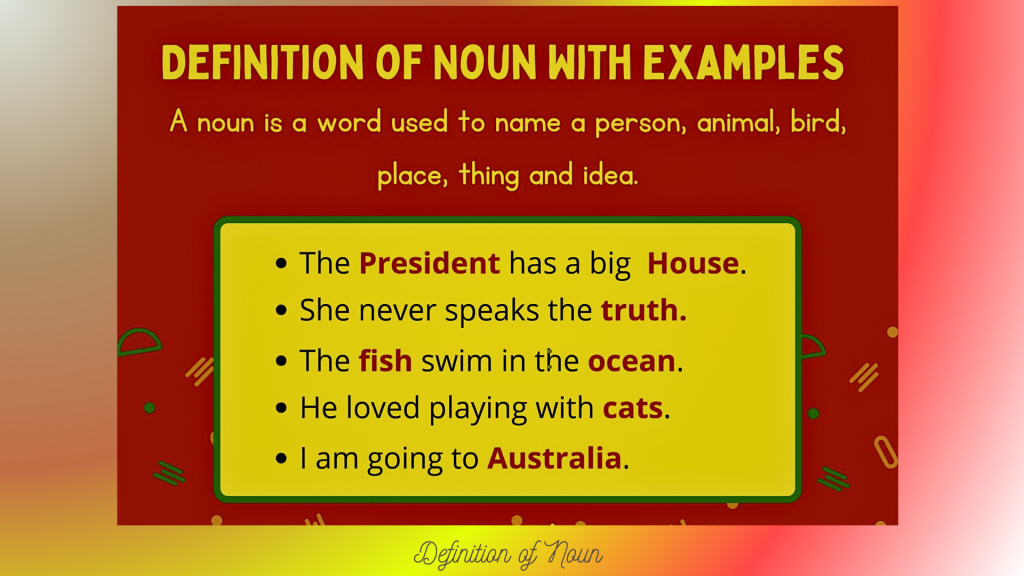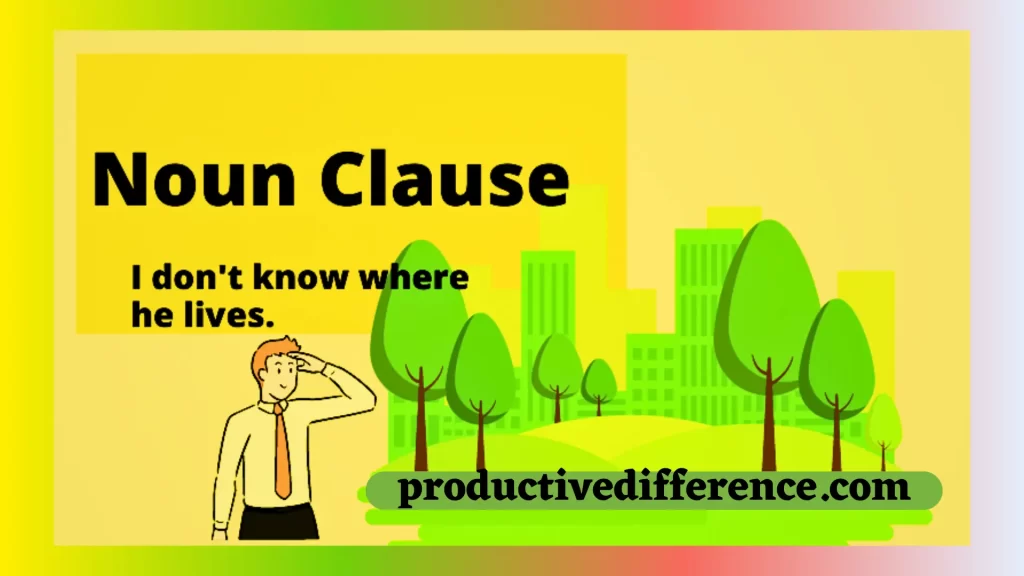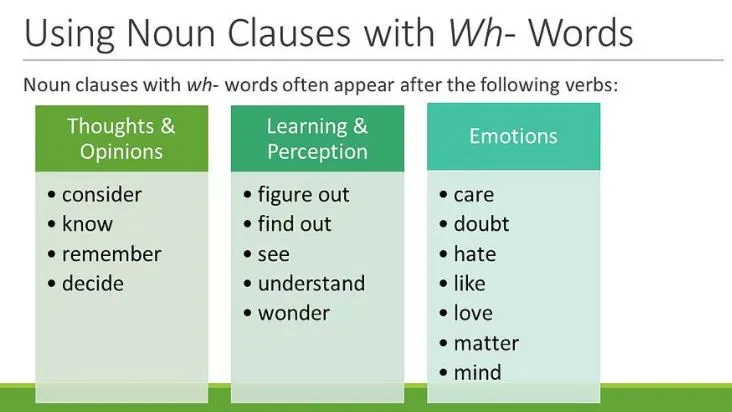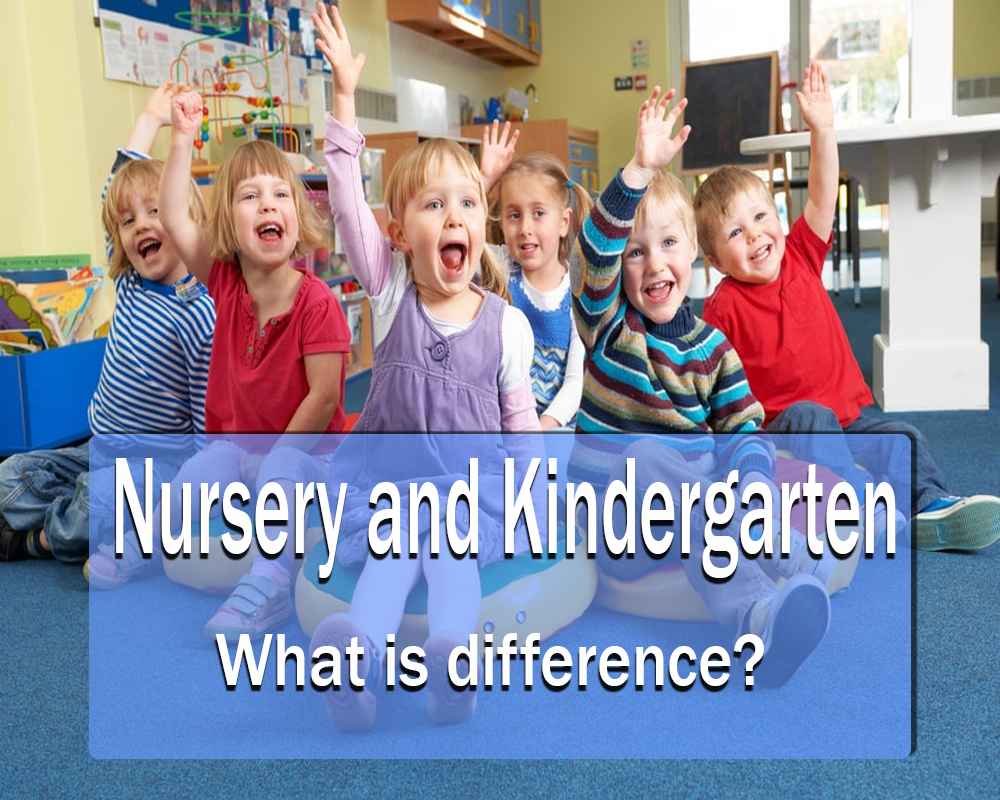Learning to identify Noun Clause and Noun Phrase can greatly improve your understanding of sentence construction.
Definition of a Noun

Nouns are a component of speech, which usually describes a person or place, object an idea or idea. It’s among the basic building blocks of a sentence. It acts as the object or subject of a verb. It also serves in conjunction with the subject or object. Nouns may be either specific (tangible items) and abstract (intangible concepts) They can be plural or singular. They play an important role in the structure of sentences and are essential elements for conveying meanings for spoken and written language.
Importance of nouns in sentence structure
Nouns are of significant importance in sentence structure for several reasons:
- Subject of a Sentence: Nouns often serve as the subject of a sentence, which indicates the main topic or doer of the action. Without a noun as the subject, a sentence may lack clarity or fail to convey a complete thought.
Example: “John is studying for his exams.” (The noun “John” acts as the subject.)
- Object of a Verb: Nouns can function as objects, receiving the action of a verb. They provide essential information about the recipient or the result of the action.
Example: “Sheila ate an apple.” (The noun “apple” acts as the direct object.)
- Complement: Nouns can act as complements, providing further information about the subject or object and completing the meaning of a sentence. They can be either subject complements or object complements.
Example: “The tree is a symbol of strength.” (The noun phrase “a symbol of strength” acts as a subject complement.)
- Modifier: Nouns can be modified by other words such as adjectives or possessive pronouns, providing additional details or specifications. This helps in creating a more vivid and descriptive sentence.
Example: “The beautiful sunset painted the sky with vibrant colors.” (The noun “sunset” is modified by the adjective “beautiful.”)
- Noun Phrases: Nouns often form the core of noun phrases, which are groups of words centered around a noun. Noun phrases function as substitutes for nouns, acting as subjects, objects, or complements in a sentence.
Example: “That book on the shelf is mine.” (The noun phrase “That book on the shelf” acts as the subject.)
Nouns are essential in sentence structure as they provide the foundational elements needed to express subjects, objects, complements, and modifiers. They contribute to the clarity, meaning, and grammatical correctness of sentences, allowing for effective communication in written and spoken language.
Noun Phrase
A noun phrase is a group of words centered around a noun that functions as a unit within a sentence. It typically consists of the noun itself and other words that modify or describe the noun. Noun phrases can act as subjects, objects, or complements in a sentence.
The structure of a noun phrase can vary, but it generally follows this pattern:
Determiner + Adjective(s) + Noun + (Prepositional Phrase) + (Relative Clause)
Let’s break down the components of a noun phrase:
- Determiner: A determiner is a word that introduces and provides information about the noun. It includes articles (e.g., “the,” “a/an”), demonstratives (e.g., “this,” “that”), possessives (e.g., “my,” “his”), and other words that specify quantity or identification (e.g., “some,” “each,” “every”).
Example: “The tall building”
- Adjective(s): Adjectives are words that describe or modify the noun, providing additional characteristics or qualities.
Example: “The tall building”
- Noun: The noun is the core element of the noun phrase. It can refer to a person, place, thing, idea, or concept.
Example: “The tall building”
- Prepositional Phrase (optional): A prepositional phrase may follow the noun and provide further details, often indicating location, time, or other relationships.
Example: “The tall building on the corner”
- Relative Clause (optional): A relative clause can be used to provide additional information about the noun. It begins with a relative pronoun (e.g., “who,” “which,” “that”) and functions as an adjective clause.
Example: “The tall building that overlooks the park”
Overall, a noun phrase functions as a unit within a sentence, and it can perform various grammatical roles, such as acting as the subject (“The tall building is new”), the object (“I visited the tall building”), or a complement (“His dream is to own the tall building”). Noun phrases enhance the specificity, description, and clarity of the nouns they modify.
Noun Clause

A noun clause is a type of dependent clause that functions as a noun within a sentence. It acts as a single unit and can perform various roles such as the subject, object, or complement.
Here are the key characteristics and components of a noun clause:
- Subordinate Clause: A noun clause is a type of subordinate clause, which means it cannot stand alone as a complete sentence and relies on the main clause for its full meaning.
- Functions as a Noun: Unlike a noun phrase, which consists of a noun and accompanying modifiers, a noun clause functions as a noun itself. It can perform the same grammatical functions as a noun, such as being the subject, object, or complement of a verb.
- Contains a Subject and Verb: A noun clause contains both a subject and a verb. The subject is typically introduced by a subordinating conjunction or a relative pronoun, and the verb is in a finite form.
- Examples of Subordinating Conjunctions: Common subordinating conjunctions that introduce noun clauses include “that,” “whether,” “if,” “when,” “where,” “why,” and “how.”
- Examples of Relative Pronouns: Relative pronouns such as “who,” “whom,” whose,” which,” and that” may also serve to introduce noun clauses when used appropriately.
Example sentences demonstrating the structure and usage of noun clauses:
- Subject Noun Clause:
- “What he said surprised me.”
- “Whether we win or lose doesn’t matter.”
- Object Noun Clause:
- “She asked me how I was feeling.”
- “I don’t know where he went.”
- Complement Noun Clause:
- “His dream is that he becomes a successful musician.”
- “The question is whether she will accept the offer.”
Noun clauses add depth and complexity to sentences by functioning as a noun and providing information, opinions, beliefs, or statements. They allow for more versatile and flexible sentence construction, enabling us to express a wide range of thoughts and ideas in a concise manner.
Differences between Noun Phrase and Noun Clause
The differences between a noun phrase and a noun clause can be understood in terms of their structure, function, and level of independence within a sentence.
Here are the key distinctions:
- Structure:
- Noun Phrase: A noun phrase is a group of words centered around a noun. It typically includes modifiers such as articles, adjectives, and prepositional phrases that describe or modify the noun.
- Noun Clause: A noun clause is a dependent clause that functions as a noun. It contains a subject and a verb and is introduced by subordinating conjunctions or relative pronouns.
- Function:
- Noun Phrase: A noun phrase functions as a noun substitute or modifier within a sentence. It can act as the subject, object, or complement of a verb.
- Noun Clause: A noun clause also functions as a noun within a sentence. It can serve as the subject, object, or complement of a verb. However, unlike a noun phrase, it is a complete clause that can function independently within a sentence.
- Verb Dependency:
- Noun Phrase: A noun phrase does not contain its own subject and verb. Instead, it relies on the main verb of the sentence for its grammatical relationship.
- Noun Clause: A noun clause contains its own subject and verb, making it a subordinate clause that can function independently within a sentence. It does not depend on the main verb of the sentence for its grammatical structure.
- Level of Independence:
- Noun Phrase: A noun phrase is a self-contained unit within a sentence but cannot function independently as a complete thought or sentence.
- Noun Clause: A noun clause is a complete clause with its own subject and verb. It can function independently as a complete thought or sentence within a larger sentence structure.
Examples to illustrate the differences:
- Noun Phrase:
- “The big house” (acts as the subject): The noun phrase “The big house” acts as the subject of the sentence.
- “She bought a book” (acts as the direct object): The noun phrase “a book” acts as the direct object of the verb “bought.”
- Noun Clause:
- “What he said surprised me” (acts as the subject): The noun clause “What he said” acts as the subject of the sentence.
- “I don’t know where he went” (acts as the direct object): The noun clause “where he went” acts as the direct object of the verb “know.”
The main differences between noun phrases and noun clauses lie in their structure, function, level of independence, and verb dependency. Noun phrases are groups of words centered around a noun that serve as noun substitutes or modifiers, while noun clauses are complete clauses functioning as nouns within a sentence, with their own subject and verb.
Comparison chart
Here’s a comparison chart highlighting the key differences between noun phrases and noun clauses:
| Aspect | Noun Phrase | Noun Clause |
|---|---|---|
| Structure | Group of words centered around a noun | Dependent clause containing subject and verb |
| Function | Noun substitute or modifier | Functions as a noun (subject, object, etc.) |
| Verb Dependency | Relies on main verb for grammatical structure | Contains its own subject and verb |
| Independence | Cannot function independently as a complete thought | Can function independently as a complete thought |
| Examples | The red car is parked outside. | What she said shocked everyone. |
| She bought a beautiful dress. | I don’t know if he will come. |

Similarities between Noun Clauses and Noun Phrase
While noun clauses and noun phrases have some key differences, they also share certain similarities.
Here are some similarities between noun clauses and noun phrases:
- Noun Function: Both noun clauses and noun phrases function as nouns within a sentence. They can serve as the subject, object, or complement of a verb.
- Sentence Components: Both noun clauses and noun phrases contribute to the structure and completeness of a sentence. They provide essential elements that help convey meaning and establish grammatical relationships.
- Grammatical Roles: Both noun clauses and noun phrases can perform similar grammatical roles, such as acting as subjects, objects, or complements within a sentence.
- Dependency: Both noun clauses and noun phrases are often dependent on other parts of the sentence. Noun phrases rely on the main verb of the sentence for their grammatical relationship, while noun clauses depend on the main clause for their complete meaning.
- Noun Modifiers: Both noun clauses and noun phrases can be modified by adjectives, prepositional phrases, or other modifiers to provide additional information and detail about the noun they center around.
- Sentence Variety: Both noun clauses and noun phrases add variety and complexity to sentence structure. They allow for the introduction of subordinate clauses or phrases that enhance the specificity, description, and depth of the noun.
Despite their similarities, it is important to note that noun clauses are complete clauses with their own subject and verb, while noun phrases are groups of words centered around a noun. This distinction sets them apart in terms of their level of independence and structural composition.
Examples of Noun Clause and Noun Phrase
Here are some examples to further illustrate the differences between noun phrases and noun clauses:
Examples of Noun Phrases:
- The red car is parked outside. (Subject)
- She bought a beautiful dress for the party. (Direct Object)
- My sister’s dog is very friendly. (Possessive Modifier)
- The book on the table belongs to me. (Prepositional Phrase Modifier)
- The man with the hat is my neighbor. (Modifier with Prepositional Phrase)
Examples of Noun Clauses:
- What she said shocked everyone. (Subject)
- I don’t know if he will come to the meeting. (Direct Object)
- His biggest fear is that he will fail the exam. (Subject Complement)
- She believes whoever works hard will succeed. (Subject of Relative Clause)
- I wonder where they went on vacation. (Object of Preposition)
The noun phrases are groups of words centered around a noun (“red car,” “beautiful dress,” “my sister’s dog,” etc.), whereas the noun clauses function as nouns and contain their own subject and verb (“What she said,” “if he will come,” “whoever works hard,” etc.). The noun phrases modify or substitute for nouns in the sentence, while the noun clauses perform noun-like functions such as subject, object, or complement.
Conclusion
Understanding the difference between noun phrases and noun clauses is important for effective sentence construction and comprehension. A noun phrase is a group of words centered around a noun, acting as a noun substitute or modifier. It includes modifiers like articles, adjectives, and prepositional phrases.
Noun phrases enhance the specificity and description of nouns in a sentence, functioning as subjects, objects, or complements. A noun clause is a dependent clause that functions as a noun. It contains a subject and a verb, and it can serve as the subject, object, or complement of a verb. Unlike noun phrases, noun clauses are complete clauses and can function independently within a sentence.


